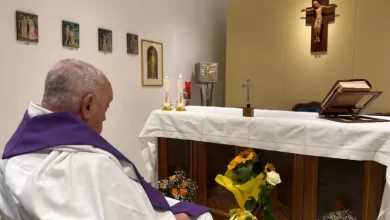Catholic courtship is not a mini-marriage, expert says

 Pep Borrell, a popularizer of the truth and beauty of Catholic courtship and marriage. / Credit: Courtesy of Pep Borrell
Pep Borrell, a popularizer of the truth and beauty of Catholic courtship and marriage. / Credit: Courtesy of Pep Borrell Madrid, Spain, Jan 7, 2025 / 08:00 am (CNA).
Pep Borrell, born in Barcelona, Spain, in 1963, is a dentist by profession, but his passion is to know and spread profound countercultural truths about dating and marriage according to the teachings of the Catholic Church.
A married father of five children with five grandchildren, he has just published the Spanish-language book “Novios 100%: Cómo tira la caña con acierto” (“All-in Couples: How To Do It Right”).
In this volume dedicated to courtship, Borrell addresses the main questions about this important stage of life with the goal of laying the foundation for a solid, happy marriage.
Using language that is familiar to young people, Borrell analyzes the phases of love, offers keys to choosing well, and takes a look at current issues such as meeting on the internet, fear of commitment, cohabitation, long-distance courtships, and the relationship with in-laws.
Speaking with ACI Prensa, CNA’s Spanish-language news partner, Borrell said sentimentality threatens Catholic dating relationships and the fundamental thing about this stage is “getting to know each other thoroughly” and that “attraction and falling in love come effortlessly to you, but you have to work on loving.”
He also emphasized the “supernatural meaning” of sexual relations in marriage and gave reasons for postponing this union during courtship while pointing out that “there is only one union more intimate between two bodies than the sexual union of spouses: the Eucharist.”
ACI Prensa: What is the greatest or most dangerous threat to a holy courtship in our day?
Borrell: Without a doubt, discouragement and lack of joy, thinking that it’s not possible and that forever-love doesn’t exist. Letting oneself be carried away by the prevailing sentimentalism that makes it difficult to consider things involving a future and commitment.
In today’s culture, it’s very common to talk about being “a couple” as a formula that doesn’t necessarily imply a commitment. What essential commitments does a courtship entail?
I like to say that courtship is not a “mini-marriage,” it’s a very different stage in which the fundamental thing is to get to know each other thoroughly to know if we are capable of sharing our life with the person we are dating.
It’s the most important choice of our life, for those of us who have a vocation to marriage, which is the vast majority, and too often it is made without much thought, only moved by feelings or by how much fun we have or by the things we share and we believe that with that person that we are dating things will go well for us for the rest of our lives. They enjoy the relationship, but they don’t know each other.
Although significant emotions are experienced, especially during courtship, you emphasize the importance of being rational in a love relationship. Why does being rational not mean that you’re “killing” love, which is so often portrayed as passionate, a little crazy and emotional?
That’s the crux of the matter: knowing how to distinguish between feelings and the will to love. One thing is what you feel and a very different thing is what you decide to do. That’s why in the initial stages of dating we should always ask ourselves a question: Is this a good fit for me?
Attraction and falling in love come effortlessly to you, but you have to work on loving. Because falling in love is pure feeling, the feeling “I feel wonderful” and love, wanting to love someone, is an act of will: “I will go out of my way to make you happy.”
That’s why I can commit to loving, because it depends on me, but I can’t commit to feeling because feelings come and go, we don’t control them. But the most interesting thing, and this is the wonder of love, is that when you work on it, when you make an effort to want the good of the other person, to think more about the other person than about yourself, feelings come back and are even more powerful.
The problem is that at first it’s not easy because falling in love is a hormonal explosion that often blinds our intellect. That’s why it’s good to let the tsunami subside, to get to know one another thoroughly in order to make the right decision, which, let’s remember, is the most important one in your life.
Nor can we act exclusively motivated by reason and keep our distance by rationally analyzing any decision we make. We must be in love to marry but not be foolish about it.
What if I don’t like anything at all about the other person?
The important thing is to know that there are things about the other person that you don’t like. We all have virtues and defects. It’s very important to know the defects of your boyfriend or girlfriend: You must love him or her with his or her virtues and defects.
If you don’t like anything at all, you have to decide if it’s a matter of opinion, important, or serious. If it’s a matter of opinion, you must not only respect that, but you must make an effort to accept it. If it’s important, you must talk about it thoroughly and make a decision. If it’s serious… let the person go; don’t get into a big mess.
A common mistake is wanting to change your boyfriend or girlfriend or expecting them to change, but we can only change ourselves. You have to know what things the other person doesn’t like in order to, as far as possible, try to do better at avoiding them. But everyone has their virtues and their defects, you have to know them and accept them or know them and let that person go.
You say that “courtship is not a nursery school.” Is there a lot of childish behavior at this stage? How can we remedy it?
There is a lot of laziness nowadays and I write the word with the masculine ending because there are more lazy men than women, although, as in everything, we’re getting to be more and more alike. Men who find it very difficult to make an effort, to commit, to sacrifice themselves, who are only gazing at their own navel, who only do what they feel like and when they feel like it.
It’s very difficult to maintain a relationship with this type of person, because a dating relationship requires effort, going all out, giving your very best. It should be a time of excitement, enthusiasm… If you see that your boyfriend lounges around on the couch a lot and is very inconsistent in managing his affairs, he’s not a good candidate to have a family with. Dating is not about being a nursemaid or a caregiver for anyone.
For Catholics, is whether a dating relationship brings you closer to God or draws you away from God the irrefutable proof to continue with the relationship or let it go?
Catholics should ask ourselves this question before making any decision in life, from the simplest to the most complicated: Does this bring me closer to God or draw me away from God? And obviously, when it comes to dating, which, I repeat, is the time when we will make the most important decision of our lives, of course we should ask ourselves this question, and if a dating relationship draws you away from God, you’ve got to let it go or find a solution.
A dating relationship should bring out the best version of yourself, it should not pull you from anyone, it should make you a better person, a better student or professional, a better friend to your friends, a better son or daughter. The best version of yourself.
Couples should help each other to achieve this. It‘s a time when you should be all aglow, eager to take on the world. If, instead, a relationship draws you away from God, your family and friends, makes you more apathetic or takes away your peace, it’s not for you, let it go.
In the book you maintain that “there is nothing safer than having sexual relations exclusively with the person you love, who is the one you decide to share your whole life with [in marriage].” Besides avoiding STDs, what other types of security are you referring to?
Sexuality is the language of love. We human beings need our bodies to say that we love each other. The greatest union between a man and a woman is to have sexual relations; it’s the height of intimacy. We give ourselves totally to each other, without conditions.
This surrender must be free, total, faithful, and fruitful and that can only happen in marriage. A relationship outside of marriage will be free, but it’s not total, because you haven’t given yourself body and soul to that person; it’s not faithful either, because you have not assured him or her that this relationship is forever, ’til death do us part; and for sure it won’t be fruitful because it won’t be open to life.
This doctrine of the Catholic Church is not designed to hassle people; it’s designed so that we can be happy on this earth and then be happy eternally in heaven.
It’s not a question of sin or prohibition, it’s a question of surrender and love, because if it’s not, what is in store for that one and only person with whom you are going to share your life and become one body?
Sexuality is a gift from God to human beings, only to us, because we are rational, we have intelligence and will to do things and we can enjoy it as we wish, collaborating with God in procreation and uniting our bodies as one flesh, image of the one and triune God, a community of love. Beautiful, God thought of us like this. How wonderful.
“In marriage, having sexual relations is praying.” How can we explain this truth revealed to the Catholic Church in a secularized society?
The supernatural meaning of sexual relations is something spectacular. God is love and the highest expression of love in marriage is the sexual union of spouses who become the image of God, two people who are joined together to form one flesh.
We express our love for God by loving our spouse; we use our body to express our love. A love that is the image of God’s love for the Church who is his spouse and which is also free, whole, faithful, and fruitful.
There is only one union more intimate between two bodies than the sexual union of spouses: the Eucharist. In communion we literally eat the body of Christ and become one with him, a miracle.
I know that it’s not easy for a nonbeliever to understand — you have to experience it, you have to enjoy it — living human love with this supernatural vision is taking it to a whole new level.
This story was first published by ACI Prensa, CNA’s Spanish-language news partner. It has been translated and adapted by CNA.





